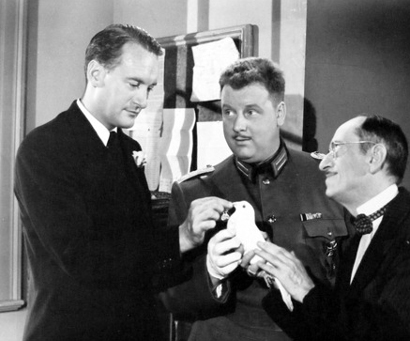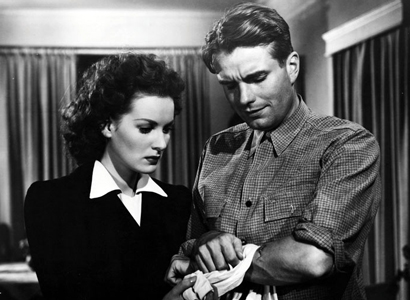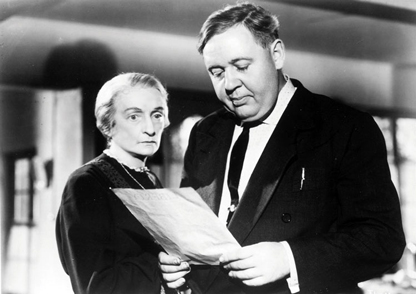
 |
|
|
|
Hollywood did its part in World War II as forcefully as any other American industry, turning out entertainments to raise morale and inform the public. Early efforts included the escapist comedy All Through the Night, an unlikely story about a Runyon-esque gangster (Humphrey Bogart) foiling a Nazi cell in New York City. John Farrow directed a carefully fictionalized drama about the last stand of Marines and civilian contractors against the Japanese on Wake Island. With the guidance of the War Department, movies celebrated our allies' resistance to invading Axis armies on a country-by-country basis. In Edge of Darkness, for example, Errol Flynn and Ann Sheridan portrayed patriotic Norwegians, battling occupying German forces. 
Playing Germans in some of these movies were newcomers to Hollywood, political and religious refugees from the film industries of Germany, Czechoslovakia, Hungary and France. Noted writers and directors came as well -- Bertolt Brecht, Robert Siodmak. One of the most prestigous émigrés was Jean Renoir, a great talent who fared reasonably well transplanted to Southern California. His Swamp Water (1941) is a superior drama about Florida backwoodsmen, and unrelated to the war. But Renoir's second Hollywood effort This Land is Mine (1943) is superior anti-Nazi propaganda. Working with writer Dudley Nichols and designer Eugène Lourié, Renoir doesn't rely on the depiction of enemy outrages to make his point. The show instead makes excellent use of actor Charles Laughton's ability to elicit strong emotions from the audience. Reuniting Laughton with his The Hunchback of Notre Dame co-star Maureen O'Hara, This Land is Mine dramatizes the fiercely patriotic need of occupied countries to resist their conquerors. Nichols' story takes place in an unnamed European town, yet the first on-screen image is a very French WW1 memorial seen from multiple angles as the occupation begins. German Major Erich von Keller (Walter Slezak) is determined to avoid strong-arm tactics, so as to minimize local resistance. The Mayor (Thurston Hall) nervously asks everyone to cooperate. Railroad manager George Lambert (George Sanders) cooperates in part because he sympathizes with the German cause. But George's fianceé, schoolteacher Louise Martin (Maureen O'Hara) is very unhappy. Major Keller correctly deduces that the school principal Professor Sorel (Philip Merivale) is the author of anti-Nazi leaflets that are circulating, and has him arrested. Louise's fellow teacher Albert Lory (Charles Laughton) shares her concern. A mama's boy, Albert is so terrified by Allied air raids that he loses the respect of his young students. Albert wants to do the right thing to impress Louise, as he's secretly in love with her -- but his selfishly domineering mother Emma (Una O'Connor) is determined to keep "that woman" away from her boy. Much to Louise's disgust, Albert meekly cooperates when they are ordered to rip pages out of the children's history books that offend the Germans. She is even more disheartened to learn that her own younger brother Paul (Kent Smith), a railroad switchman, is chummy with the occupying Germans, and even turns in leaflets when he finds them. Paul's activities alienate his girlfriend Julie (Nancy Gates) as well. Louise feels as if she is the town's lone patriot. 
The deceptively straightforward This Land is Mine carefully sets up each male character to experience a crisis of conscience. The script's most sophisticated angle is that Walter Slezak's Major Keller is neither an ideologue nor a sadist, as was so often the case in wartime films. He actually suppresses evidence of sabotage as long as possible, in the knowledge that reprisals will only lead to more resistance. The men of the town range from a Quisling to a secret saboteur, but they're all judged through Louise, the Maureen O'Hara figure. She's disillusioned by the way her brother and fiancé calmly accept the occupation, even after the respected Professor Sorel is taken away. Albert seems the only man Louise is able to influence. The pudgy, innocuous schoolteacher impresses nobody, especially when he cowers in the bomb shelter, as women and children sit calmly to each side. But Professor Sorel's arrest grants him an understanding of the nature of tyranny. Albert cannot control his mother, who goes to City Hall with the notion that the Mayor will have to do what she says because he tried to kiss her back in school. Later, understanding that his mother has caused the death of a true patriot, Albert seeks to atone for her while also striking a propaganda blow against his oppressors. The Germans force the town to try him for a murder he didn't commit, but he uses the defendant's box as a pulpit to deliver a scathing anti-Nazi speech. His courage demonstrates that he's the man truly worthy of Louise, even if he'll have to pay with his life. Major Keller won't find it easy to keep the locals in line, after Albert's sterling example of patriotic defiance. This Land is Mine is a sterling showcase for Charles Laughton's formidable acting skills. The story is practically built around his talent. Laughton provides a gentle comic relief, playing the milquetoast with his bossy mom (Una O'Connor at her most screechy). He pets Louise's housecat as a substitute for petting her. Part of Albert's conversion shows him coming to the aid of one of his students teased and harassed because he is a Jew. The film's climax consists of three bravura solo speeches. In one of two courtroom scenes Albert interrupts his anti-Nazi argument to proclaim his love for Louise. Albert's now-adoring pupils receive an emotional stunner that will surely inoculate them against whatever ideological poison Major Keller can devise. Nichols, Renoir and Laughton make the speeches count as heartfelt anti-Fascist protest; unlike Charlie Chaplin's oratory at the end of The Great Dictator, this is a more proactive plea for humanity and justice against evil. 
The story works on a emotional, theatrical level that neutralizes certain objections: it's altogether clear that Albert Lory's courtroom oratory would be quickly curtailed. The Germans arresting Albert would more likely hustle him from his classroom before he could say a single word. The inoffensive Albert has a special appeal for audiences that can't personally identify with dashing Errol Flynn heroics. For every Alpha Male in the audience there were surely forty nice guys that recognized a bit of Albert's shyness in themselves. Ordinary Joes might fantasize themselves as combat heroes, but Albert's moral martyrdom has the special side benefit of beautiful Louise Martin's undying love and affection. Rewards are where one finds them. Of all of Hollywood's melodramas about brave resistance to Nazi occupation, Renoir's This Land is Mine has perhaps dated the least. We soon accept the nondescript names and generic "European" settings, which could stand in for any occupation, anywhere. Charles Laughton made several more wartime pictures, even playing an unlikely Admiral opposite Robert Taylor. Maureen O'Hara continued to be one of RKO's most beautiful attractions, mostly in lighter material. Jean Renoir made three more Hollywood features, staying on in America until 1947. His European career didn't resume until 1951's The River, a picture filmed entirely in India. 
The Warner Archive Collection DVD-R of This Land is Mine is a good if not outstanding encoding of this fine wartime propaganda picture. Because of its stellar Charles Laughton performance, the movie enjoyed constant TV syndication through the 1950s and '60s. The opening reel has quite a bit of printed-in dirt flecks, which return at reel changes. But the film is intact, reasonably sharp and carries a strong audio track.
On a scale of Excellent, Good, Fair, and Poor,
This Land is Mine rates:
Reviews on the Savant main site have additional credits information and are often updated and annotated with reader input and graphics. Also, don't forget the 2011 Savant Wish List. T'was Ever Thus.
Review Staff | About DVD Talk | Newsletter Subscribe | Join DVD Talk Forum |
| ||||||||||||||||||